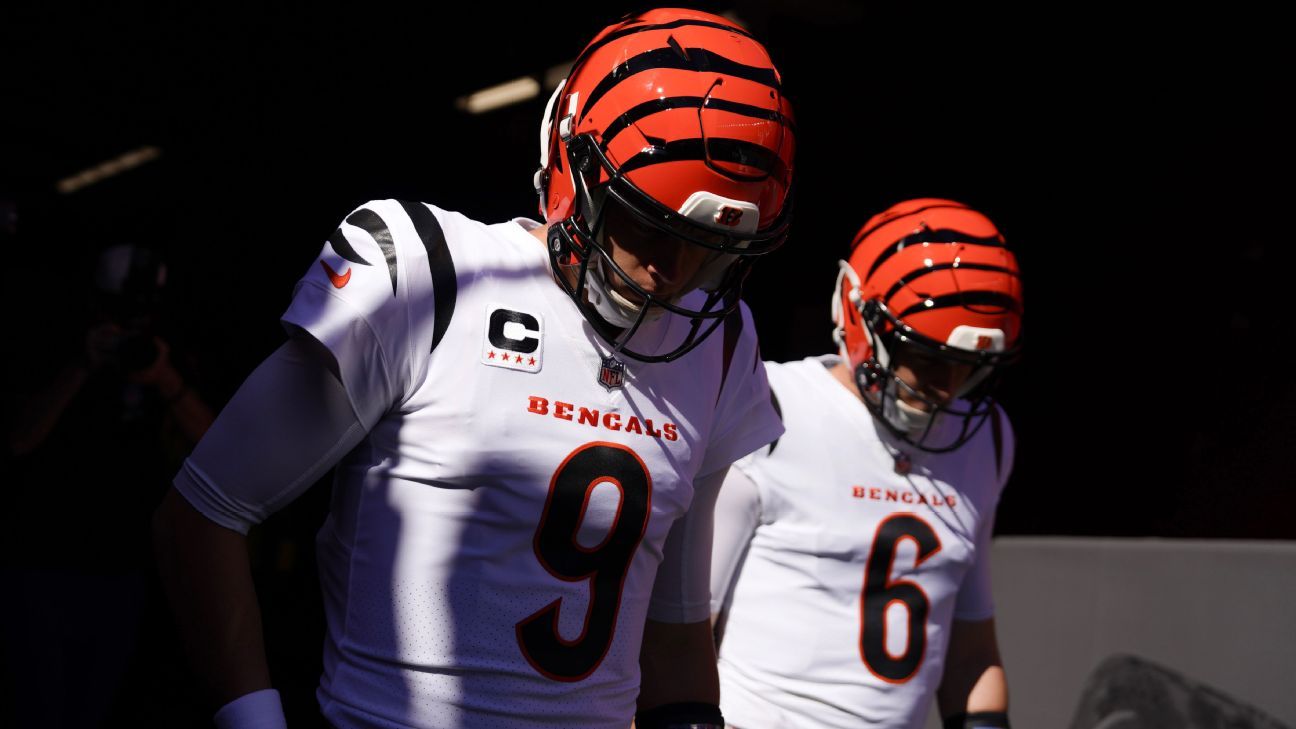“I DON’T LOOK like a quarterback,” Jake Browning says.
Standing in the doorway of his offseason home one afternoon last spring, 6-foot-2 and toned but not towering and hulking, he more specifically doesn’t look like a starting quarterback. But that’s why I’m here. Last December, during a Monday night Bengals-Jaguars game, Joe Burrow was out with a torn ligament in his right wrist. That meant Browning — undrafted out of Washington in 2019, in his fifth year after spending most of four seasons on the practice squad in Minnesota and Cincinnati — was in, making his second career start.
For most of the night, he was steady but unremarkable. Then, midway through the fourth quarter, something changed, the way it does for a few backup quarterbacks each year, invisible benchwarmers who get a break, like Brock Purdy or Joshua Dobbs, guys who don’t just take the field in relief of the injured starter but display a little magic. The Bengals scored 10 points and the game went into overtime. After Jacksonville punted, Browning took over, leading the Bengals on a 12-play, 42-yard drive to set up the game-winning field goal. In all, he hit 32 of 37 passes for 354 yards. That earned him a postgame interview on the field. Browning explained that he’d had years to study himself, indicating that he didn’t like what he saw, a general disposition more than a specific technique, and he had found clarity in how he played best:
“That’s just when I’m calm.”
He said it so casually that it was easy to miss. But there was a metamorphosis in it, something that went beyond talent and luck and smarts. He’d been broken as a quarterback and found a way forward. Troy Aikman noticed it from the booth. Viewing from home, Steve Young later told me that he saw a transformation of sorts, which he recognized from experience. That’s why I’m visiting Browning. He had wondered for years, sometimes out loud but mostly in his head, Do I have it? He not only found answers within himself. He found them by studying Burrow — who as it turns out, is the opposite of everything about quarterbacks that Browning, and maybe all of us, believed was true.
WE ROUND THE corner left out of the entryway and into a living room, with random papers and books scattered, couch pillows vaguely displaced. It’s not a mess, not exactly, but it’s messy. Browning starts to tidy up. “I can focus on like two or three things really well,” he says, more explanation than apology. “Then, outside of that, I struggle to give a s—.”
His longtime girlfriend, Stephanie Niles, pokes in and politely introduces herself. She looks around and exits, content to not help Browning solve a problem he created.
“If we didn’t live here together, this place would be destroyed,” he says.
Neither of them would be in this place, on the south end of Beverly Hills, if he hadn’t fought like hell for the past few years to keep his career alive. Niles has been wanting to try acting for years, but their life felt too chaotic to take career risks simultaneously. He was always on the roster bubble. She worked as an associate at the multinational firm PricewaterhouseCoopers and then as a project manager at a company called Decked. But now, with Browning set to sign a two-year contract extension averaging $972,500 a year, she’s going to give Hollywood a try. It’s not starter dough, not even Chase Daniel-level backup dough — Browning is 28 years old but basically on a rookie contract — but better than what nearly happened three years ago.
In 2021, the Vikings told Browning to wait at a hotel for a call, all but offering a role of some sort for him. He had been with the Vikings almost three years, all on the practice squad, zero regular-season appearances, and shaky preseason play. Still, Browning was accustomed to living in ambiguity. He sat at the hotel for hours, not knowing if he’d had a job or not. Finally, his agent called with news that the Vikings were moving on. They had drafted Kellen Mond in the third round in 2021 after a fine Texas A&M career, and they didn’t need more quarterbacks — especially one like Browning, one that appeared to have plateaued. Browning was livid, especially that nobody from the team could be bothered to break the news.
He decided to wait 48 hours to see if another team called. Otherwise, he was set to become a volunteer coach at Oregon State, where his father Ed played quarterback in the early ’90s. It would not just be a cross-country move. It would be an epic conceit, an admission that he couldn’t do it, ensuring that he would be haunted for a life of wondering why he — after setting a national record with 229 career touchdown passes at Folsom High outside of Sacramento; after earning Pac 12 Offensive Player of the Year at Washington, finishing sixth in Heisman voting, and leading the Huskies to the College Football Playoff — couldn’t cut it at the highest level. Why after all the football and psychology books, why after all the months in therapy and retooling his mechanics with private coaches, he still lacked that seemingly mysterious quality that allows NFL quarterbacks to not just manage chaos but to thrive in it.
“I was beat to s—,” he says.
